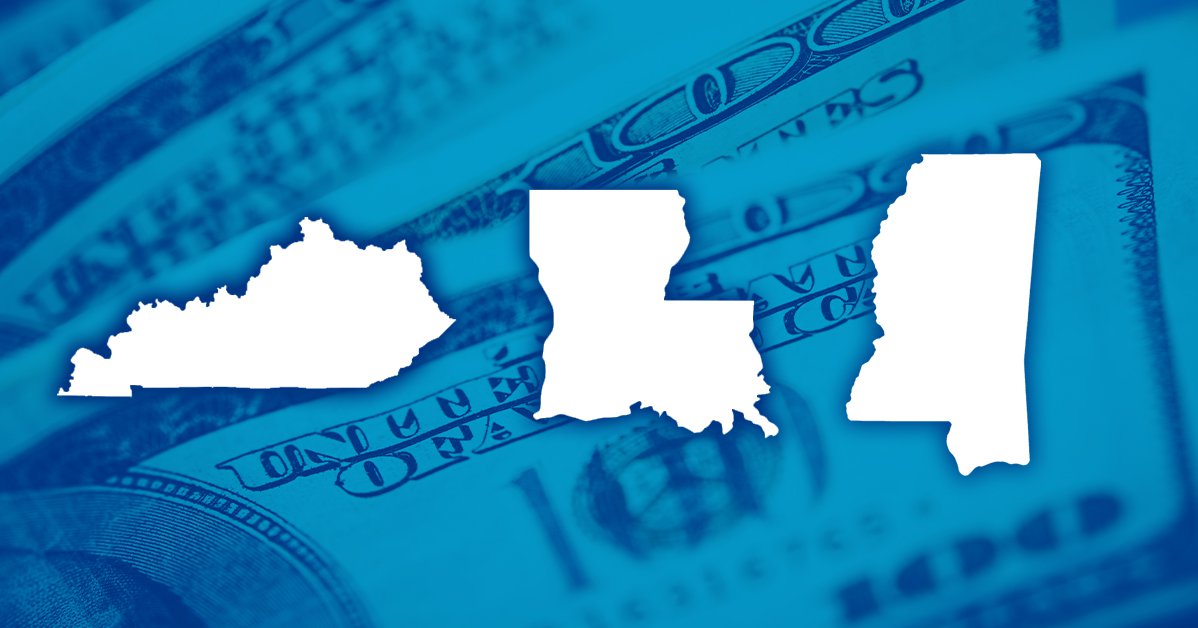The fast-approaching gubernatorial elections in Kentucky, Mississippi, and Louisiana will determine if these states will build upon the economic growth from the federal tax cuts and regulatory reform.
Of these states, Mississippi is the only one without an incumbent on the ballot. Lt. Gov. Tate Reeves, who is a Republican, is running against Attorney General Jim Hood to succeed Gov. Phil Bryant, a Republican who will be termed out of office this year.
Reeves and Bryant worked together in 2016 to deliver the largest tax cut in Magnolia State history, and Reeves has made clear that he will continue this pro-taxpayer record as governor. Reeves has promised the taxpayers across Mississippi, in writing, that if elected, he will oppose and veto all tax increases. Hood refuses to make this same commitment to Mississippi taxpayers, indicating that tax hikes will be on the table if he is elected. Election Day in Mississippi is Nov. 5.
Kentucky Gov. Matt Bevin, a Republican, is running for his second term against Attorney General Andy Beshear. As with Reeves in Mississippi, Bevin has fought all efforts to raise taxes. He vetoed a $400 million tax hike last year that was unfortunately overridden by the legislature. Election Day in Kentucky, like Mississippi, is Nov. 5.
Meanwhile, in Louisiana, Gov. John Bel Edwards, a Democrat, is seeking reelection with a record that is very different from that of Reeves and Bevin. He said he would not raise taxes when he ran for governor in 2015.
Edwards won. Then he raised taxes. A lot.
The first $1.5 billion tax hike imposed by Edwards came in 2016 in the form of a “temporary” 25% sales tax increase. The state sales tax rate was increased from 4% to 5%. That tax increase, the largest in Pelican State history, was supposed to expire on June 30, 2018. Predictably, that tax hike has been more permanent than originally advertised.
Edwards called three special sessions in 2018, costing taxpayers more than $1.5 million in total at an average of $42,921 per day, until enough lawmakers eventually agreed to renew $0.45 of the “temporary” penny sales tax hike. This tax increase, which amounts to roughly $465 million a year, will remain on the books until June 30, 2025.
Unfortunately for Louisianians, the sales tax renewal was not the only tax hike Edwards demanded in 2018. Without legislative approval, he also imposed a more than $300 million income tax hike.
Louisiana is one of a handful of states that allows taxpayers to deduct their federal taxes when calculating their income for state tax purposes. Due to this policy, the federal Tax Cuts and Jobs Act, which reduced federal income taxes for 90% of taxpayers, resulted in an unintended tax hike at the state level in Louisiana.
Edwards could have easily prevented this income tax hike by enacting rate-reducing tax reform, such as the reforms done by Republican Govs. Kim Reynolds of Iowa and Nathan Deal of Georgia, to ensure their constituents were able to benefit from their entire federal tax cut. But Edwards took the cash.
...
As such, it is not surprising to learn that Louisiana is the only state in the South that has been missing out on the job growth fueled by federal tax cuts and regulatory reforms. From July 2018 to July 2019, Louisiana lost 1,000 jobs, making it the only state in the entire country to have lost jobs during that time period.
During this same time period, Texas gained 323,300 jobs, Oklahoma gained 14,500, Arkansas gained 12,100, Mississippi gained 19,000, Alabama gained 12,100, and Florida gained 227,200.
Edward’s dismal record has attracted two major Republican challengers: businessman Eddie Rispone and Congressman Ralph Abraham. Primary Day in Louisiana is Oct. 12, and under Louisiana’s jungle primary system, all candidates, regardless of party, will appear on the same ballot. Unless one candidate wins more than half of the vote, the top two will go to a runoff on Nov. 16.
Fall elections in these 3 states are critical for taxpayers
It's no surprise that Louisiana is the only state in the South that has been missing out on the job growth fueled by federal tax cuts and regulatory reforms.







